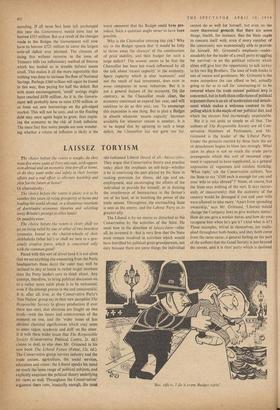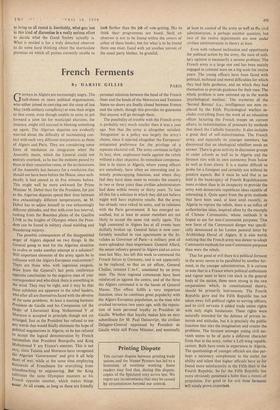LAISSEZ TORYISM
The choice before the voters is simple; do they want five more years of Tory mis-rule, with aggres- sion abroad and an economic free-for-all at home, or do they want order and safety in their foreign affairs and a real effort to alleviate hardship and plan for the future at home?
Or alternatively: The choice before the voters is plain; is it to be another five years of rising prosperity at home and leading the world abroad, or a disastrous interlude of doctrinaire economic theories and whittling away Britain's prestige in other lands?
Or possibly even : The choice before the voters is clear; .shall we go on being ruled by one or other of two heartless tyrannies, bound to the chariot-wheels of their .thibboleths (what ho!) or shall we turn to a gen- uinely creative force, which is concerned only with the common good?
Faced with this sort of drivel (and it is not often that we see anything else emanating from the Party headquarters these days) the voter may well be inclined to stay at home in rather larger numbers than the Party leaders care to think about. Any attempt, therefore, to bring political discussion on to a rather more adult plane is to be welcomed, even if the attempt proves in the end unsuccessful. It is, after all, true, as the Conservative Party's 'One Nation' group say in their new pamphlet The Respolisible Society (a glossy production if ever there was one), that elections are fought on two levels—with the issues and controversies of the moment on one, and the 'wider issues of less obvious electoral significances which may seem to some vague, academic and dull' on the other. It is with these wider issues that The Responsible Society (Conservative Political Centre, 2s. 6d.) claims to deal, as also does Mr. Grimond in his new book The Liberal Future (Faber, 12s. 6d.). The Conservative group surveys industry and the trade unions, agriculture, the social services, education and crime; the Liberal speaks his mind on much the same range of political subjects, and explicitly examines the political theory underlying his views as well. Throughout the Conservatives' argument there runs, ironically enough, the most old-fashioned Liberal thread of all—laissez-faire. They argue that Conservative theory and practice today place the emphasis on self-help-7whether it be in restricting the part played by the State in making provision for illness, old age and un- employment, and encouraging the efforts of the individual to provide for himself, or in limiting the interference of bureaucracy in the farmer's use of his land, or in watching the power of the trade unions. Throughout, the encroaching State is seen as the enemy, and the Labour Party as its greatest ally.
The Liberal is by no means as disturbed as the Conservative by the activities of the State. He must bow in the direction of laissez-faire—after all, he invented it—but is very firm that the State must remain involved in activities which would have horrified his political great-grandparents, not only because there are some things the individual cannot do as well for himself, but even on the more theoretical grounds that there are some things, health, for instance, that the State ought to concern itself with, even if every member of the community was economically able to provide for himself. Mr. Grimond's emphasis—under- standably for the leader of a small party struggling for survival—is on the political reforms which alone will give him the opportunity to talk turkey to his two Big Brothers. The tone of both books is one of reason and gentleness; Mr. Grimond is the more outspoken (he can afford to be), actually going so far as to call for 'contracting-in' to be restored where the trade unions' political levy is concerned, but in both these collections of political argument there is an air of moderation and detach- ment which makes a welcome contrast to the yelling which is the staple of our political diet, and which the electors find increasingly unpalatable.
But it is not quite so simple as all that. The authors of The Responsible Society are all Con- servative Members of Parliament, and Mr. Grimond is the leader of the Liberal Party. Under the pressure exerted by these facts the air of detachment begins to blow less strongly. What takes its place is not so much the crude party propaganda which this sort of reasoned argu- ment is supposed to have supplanted, as a general impression of vagueness and careless thinking. `What right,' ask the Conservative authors, 'has the State to say "£100 each is enough for you and your wife to take abroad"?' None, of course, but the State says nothing of the sort. It says (accur- ately or inaccurately) that the economy of the country would be damaged if you and your wife were allowed to take more. 'Apart from spreading ownership,' says Mr. Grimond, 'Liberals would change the Company laws to give workers status.' How do you give a worker status, and how do you recognise him when he's got it? (And what is it?) These examples, trivial in themselves, are multi- plied throughout both books, and they both come from the same cause; a general feeling on the part of the authors that the Good Society is just beyond the corner, and it is their party which is destined 'But, officer, I do it every Budget night.' to bring us all round it. Inevitably, what gets lost in this kind of discussion is a really serious effort to decide what the Good Society actually is. What is needed is for a truly detached observer to do some hard thinking about the inarticulate premises on which all parties currently unable to look farther than the job of vote-getting, like to think their programmes are based. Such an observer is not to be found within the covers of either of these books; but for what is to be found there one must, faced with yet another torrent of the usual party blether, be grateful.















































 Previous page
Previous page